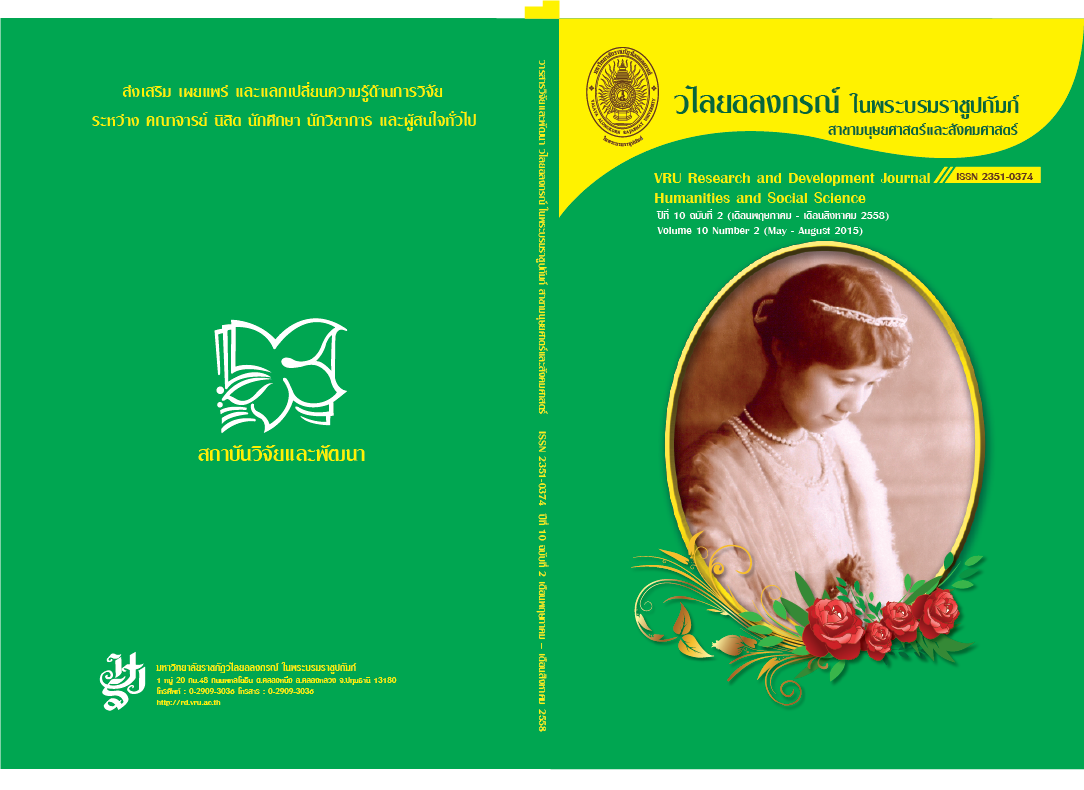ปัจจัยเชิงสาเหตุและประโยชน์ทางธุรกิจของการมีความรับผิดชอบต่อสังคม ขององค์กรธุรกิจในอุตสาหกรรมเครื่องใช้ไฟฟ้าและอิเล็กทรอนิกส์
Main Article Content
Abstract
การวิจัยครั้งนี้มีวัตถุประสงค์เพื่อศึกษาปัจจัยเชิงสาเหตุและประโยชน์ทางธุรกิจของการมีความรับผิดชอบต่อสังคมขององค์กรธุรกิจในอุตสาหกรรมเครื่องใช้ไฟฟ้าและอิเล็กทรอนิกส์ องค์กรธุรกิจจำนวน 476 องค์กรได้รับการเลือกให้เป็นกลุ่มตัวอย่างของการวิจัย กลุ่มตัวอย่างถูกเลือกโดยใช้เทคนิคการเลือกตัวอย่างแบบแบ่งชั้นภูมิ เก็บรวบรวมข้อมูลโดยใช้แบบสอบถาม และทดสอบสมมติฐานโดยใช้แบบจำลองสมการเชิงโครงสร้าง ผลการวิจัยสรุปได้ดังนี้ (1) วัฒนธรรมมุ่งเน้นพนักงาน วัฒนธรรมมุ่งเน้นการเปลี่ยนแปลง วัฒนธรรมมุ่งเน้นโครงสร้างอำนาจ ภาวะผู้นำการเปลี่ยนแปลง และการเผยแพร่ความรู้ มีอิทธิพลเชิงบวกต่อการมีความรับผิดชอบต่อพนักงาน ในขณะที่การมีความรับผิดชอบต่อพนักงานมีอิทธิพลเชิงบวกต่อการเพิ่มขึ้นของลูกค้าใหม่ ผลิตภาพการผลิต พฤติกรรมการเป็นพนักงานที่ดี และการรักษาพนักงานไว้ในองค์กร (2) วัฒนธรรมมุ่งเน้นพนักงาน วัฒนธรรมมุ่งเน้นตลาด ภาวะผู้นำการเปลี่ยนแปลง และการแสวงหาความรู้ มีอิทธิพลเชิงบวกต่อการมีความรับผิดชอบต่อลูกค้า ในขณะที่การมีความรับผิดชอบต่อลูกค้ามีอิทธิพลเชิงบวกต่อนวัตกรรมผลิตภัณฑ์ (3) วัฒนธรรมมุ่งเน้นพนักงาน วัฒนธรรมมุ่งเน้นโครงสร้างอำนาจ วัฒนธรรมมุ่งเน้นตลาด และภาวะผู้นำการเปลี่ยนแปลง มีอิทธิพลเชิงบวกต่อการมีความรับผิดชอบต่อผู้จำหน่ายวัตถุดิบ ในขณะที่การมีความรับผิดชอบต่อผู้จำหน่ายวัตถุดิบมีอิทธิพลเชิงบวกต่อความภักดีของลูกค้าและพฤติกรรมการเป็นพนักงานที่ดี (4) วัฒนธรรมมุ่งเน้นพนักงาน ภาวะผู้นำการแลกเปลี่ยน และการเก็บรักษาความรู้ขององค์กรมีอิทธิพลทางตรงเชิงบวกต่อการมีความรับผิดชอบต่อผู้ถือหุ้น แต่ภาวะผู้นำการเปลี่ยนแปลงมีอิทธิพลเชิงลบต่อการมีความรับผิดชอบต่อผู้ถือหุ้น ในขณะที่การมีความรับผิดชอบต่อผู้ถือหุ้นมีอิทธิพลเชิงบวกต่อความสามารถในการทำกำไร แต่มีอิทธิพลเชิงลบต่อผลิตภาพการผลิต อาจารย์ประจำภาควิชาบริหารธุรกิจ มหาวิทยาลัยราชภัฏชัยภูมิ (5) วัฒนธรรมมุ่งเน้นตลาด การแสวงหาความรู้ และการเผยแพร่ความรู้ในองค์กรมีอิทธิพลทางตรงเชิงบวกต่อการมีความรับผิดชอบต่อชุมชน ในขณะที่การมีความรับผิดชอบต่อชุมชนไม่มีอิทธิพลต่อผลการดำเนินงานขององค์กร (6) วัฒนธรรมมุ่งเน้นการเปลี่ยนแปลง การตีความหมายของความรู้ และการเก็บรักษาความรู้ขององค์กรมีอิทธิพลเชิงบวกต่อการมีความรับผิดชอบต่อสิ่งแวดล้อม ในขณะที่การมีความรับผิดชอบต่อสิ่งแวดล้อมมีอิทธิพลทางตรงเชิงบวกต่อผลิตภาพการผลิต
Article Details
ลิขสิทธิ์บทความวิจัยที่ได้รับการตีพิมพ์เผยแพร่ในวารสารมนุษยศาสตร์และสังคมศาสตร์ วไลยอลงกรณ์ ในพระบรมราชูปถัมภ์ ถือเป็นกรรมสิทธิ์ของคณะมนุษยศาสตร์และสังคมศาสตร์ มหาวิทยาลัยราชภัฏวไลยอลงกรณ์ ในพระบรมราชูปถัมภ์ ห้ามนำข้อความทั้งหมดหรือบางส่วนไปพิมพ์ซ้ำ เว้นแต่จะได้รับอนุญาตจากมหาวิทยาลัยเป็นลายลักษณ์อักษร
ความรับผิดชอบ เนื้อหาต้นฉบับที่ปรากฏในวารสารมนุษยศาสตร์และสังคมศาสตร์ วไลยอลงกรณ์ ในพระบรมราชูปถัมภ์ เป็นความรับผิดชอบของผู้นิพนธ์บทความหรือผู้เขียนเอง ทั้งนี้ไม่รวมความผิดพลาดอันเกิดจากเทคนิคการพิมพ์
References
รัชดา สิงคาลวณิช. 2551. “มาตรฐานแรงงาน SA8000 เพื่อความปลอดภัยในโรงงานอุตสาหกรรม. Quality:
The First Quality Magazine in Thailan. ปีที่15 เล่มที่ 133.
วาริน สีมะวัฒนา. 2551. เปิดแผนยุทธศาสตร์อุตสาหกรรมไฟฟ้าและอิเล็กทรอกนิกส์ไทย. Quality: The First Quality Magazine in Thailand. ปีที่15 เล่มที่129.
Bhattacharya, C.B., Korschun, D. and Sen, S. 2009. Strengthening stakeholder-company relationships through mutually beneficial corporate social responsibility initiatives. Journal of Business Ethics. 85: 257-72.
Brønn, P.S., Vidaver-Cohen, D. 2009. Corporate motives for social initiative: legitimacy, sustainability or the bottom line?. Journal of Business Ethics. 87: 91-109.
Friedman, M., and Friedman, R. 1962. Capitalism and Freedom. University of Chicago Press, Chicago.
Ghobadian, A., Gallear, D., and Hopkins, M. 2007. TQM and CSR nexus. International Journal of Quality & Reliability Management. 24(7): 704-721
Heslin, P.A. and Ochoa, J.D. 2008. Understanding and developing strategic corporate social
responsibility. Organizational Dynamics. 37(2): 125-44.
Hu, Y.C. and Wang, C.C.F. 2009. Collectivism, corporate social responsibility and resource
advantages in retailing. Journal of Business Ethics. 86: 1–13.
Husted, B.W. and Allen, D.B. 2007. Corporate social strategy in multinational enterprises: antecedents and value creation. Journal of Business Ethics. 74: 345-61.
Husted, B.W. and Allen, D.B. 2009. Strategic corporate social responsibility and value creation. Manag int Rev. 49:781–799.
Lin, C.P. 2009. Modeling corporate citizenship, organizational trust, and work engagement based on attachment theory. Journal of Business Ethics. Published online, 11 December.
Lindgreen, A., Swaen, V. and Johnston, W.J.. 2009. Corporate social responsibility:
An empirical investigation of U.S. organizations. Journal of Business Ethics, 85: 303-323.
Markley, M.J. and Davis, L. 2007. Exploring future competitive advantage through sustainable supply chains. International Journal of Physical Distribution & Logistics nagement. 37(9) :763-774.
Meehan, J. Meehan, K. and Richards, A. 2006. Corporate social responsibility: the 3C-SR model. International Journal of Social Economics. 33(5/6): 386-98.
Mitchell, R.J. 1993. Path analysis: pollination. In: Design and Analysis of Ecological Experiments (Scheiner, S.M. and Gurevitch, J., Eds.). Chapman and Hall, Inc. New York, NY. pp. 211-231.
Nikolaou, I.E. and Evangelinos, K.I. 2010. Classifying current social responsibility accounting methods for assisting a dialogue between business and society. Social Responsibility Journal. 6(4): 562-79.
Perrini, F. 2006. SMEs and CSR theory: evidence and implications from an Italian perspective. Journal of Business Ethics. 76: 305-16.
Sotorrio, L.U. and Fernandez Sanchez, J.L. 2008. Corporate social responsibility of the most highly reputed European and North American firms. Journal of Business Ethics. 82: 379-90.
Vilanova, M., Lazano, J.M. and Arenas, D. 2009. Exploring the nature of the relationship between CSR and competitiveness. Journal of Business Ethics. 87: 57-69.
Weysig, F. 2007. Corporate social responsibility. Accountancy Business and the Public Interest. 6(1):1-58.
Worthington, I. 2009. Corporate perceptions of the business case for supplier diversity: How socially responsible purchasing can pay. Journal of Business Ethics. 90:47-60
Yamane, T. 1973. Statistics: An Introductory Analysis.Third Edition, USA: Harper & Row


